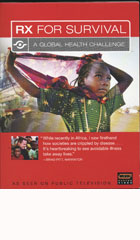
Rx for Survival: A Global Health Challenge 2005
Distributed by WGBH Boston, 125 Western Avenue, Boston, MA 02134; 617-300-2000
Produced by Larry Klein (series executive producer)
Various Directors
DVD, color, 336 min., 3 discs
Sr. High - Adult
Health Sciences, Anthropology, Political Science
Date Entered: 03/22/2006
Reviewed by Lori Widzinski, Health Sciences Library, University at Buffalo, State University of New YorkRx for Survival: A Global Health Challenge is the major component of the Rx for Survival Project—a major public education program on global health issues. With funding from the Bill and Melinda Gates Foundation and the Merck Company Foundation, the WGBH/NOVA Science Unit and Vulcan Productions have created an outstanding 3-hour film addressing the major public health issues facing us today including a historical perspective, and given what we know, where we are likely headed.
Each of the 6 one-hour programs has an overall theme, with 7 chapters listed on the DVD menu. Disease Warriors looks at three of the major disease outbreaks around the world – polio, smallpox, and AIDS. In this, and in all six programs in this series, the focus is on two major components of fighting huge outbreaks of disease: creating or finding an answer and distributing it to vast numbers of people. Based on the work of 18th and 19th century vaccine developers (Jenner, Pasteur), researchers in the 20th and 21st centuries are continuing to find ways of eradicating disease. Innovative means of distributing vaccines and other drugs arise and have a major impact on world health. The AIDS pandemic, particularly in Africa and other third world nations, has kicked things up a notch. It is not only difficult to create a vaccine that will work with a damaged immune system, but until a vaccine is developed, large scale prevention tactics are beginning to fail.
Rise of the Superbugs delves into the very scary world of drug-resistant organisms. As in Disease Warriors, the historical background sets the stage with incredibly well-done reenactment scenes. Driving this crisis is the economic disincentive to produce a greater variety of antibiotic and antiviral drugs. Pharmaceutical companies make quite a bit more money alleviating the symptoms of those with chronic diseases.
Delivery of drugs and vaccines is just as important a part of the equation as the drugs themselves, and in Delivering the Goods, some innovative success stories are highlighted. Changing the infrastructures in places like Thailand, Bangladesh, and Africa are crucial to the successful prevention of deadly epidemics. Bringing technology and delivering crucial information to rural areas, challenging cultural, religious, and economic barriers all bring fruitful changes to improve public health.
Deadly Messengers explores the world of vector-borne illness, focusing on the West Nile Virus outbreaks in the U.S. It touches on the yellow fever outbreak in Cuba at the turn of the last century, as well as malaria and river blindness in Africa.
We already know so much about fighting disease and promoting good health. Two parts of the foundation are clean water and good nutrition, yet many of the world’s current epidemics involve a lack of those basic necessities. Back to the Basics shows how delivering appropriate vitamins and clean, filtered water can make quite a dramatic difference in the incidence of disease, and on the economics of an entire region. Lest one thinks developing countries have all the public health problems, remember that we in the West are experiencing one of our largest public health crises in decades: obesity. The long term problems caused by generations of overweight Americans, will tax our health care system and government support beyond current limits. Looking at new strains of avian flu, AIDS, tuberculosis, How Safe Are We? highlights some of the new ways to fight these invaders. Reinforcing that history has built the foundation on which almost all new discoveries are made, researchers are exploring the roles of DNA, how virus mutate, and new methods of conquering bacteria.
WGBH has created another exemplary set of videos, each expertly done. Seamless editing weaves historical reenactments with present day interviews and live footage. Coupled with appropriate music, the total package emphasizes the dramatic events which have unfolded - unparalleled health research and discovery that no matter how recent or high-tech, are based on the same methods and ground-breaking cures of the last two centuries.
There are few, if any, other educational documentaries available that encompass the history, research, and current trends in public health and explain the science behind it as effectively as Rx for Survival: A Global Health Challenge. In our highly developed, computerized society, this program reminds us that we are living biological organisms subject to bugs, parasites, viruses, bacteria that will make us sick, kill us, and create changes to move us forward. It achieves one of the major goals of the Rx for Survival Project – to spur viewers on to find ways to help combat global health crises.
Rx for Survival: A Global Health Challenge is highly recommended for senior high through adult viewers, and is appropriate for library collections supporting courses in public health, health professions, global studies, political science and anthropology.
Also available from PBS is The Heroes, a 2 hour special made of highlights from this six hour series.